地道英语感叹词的用法知识分享
关于英文中的感叹词
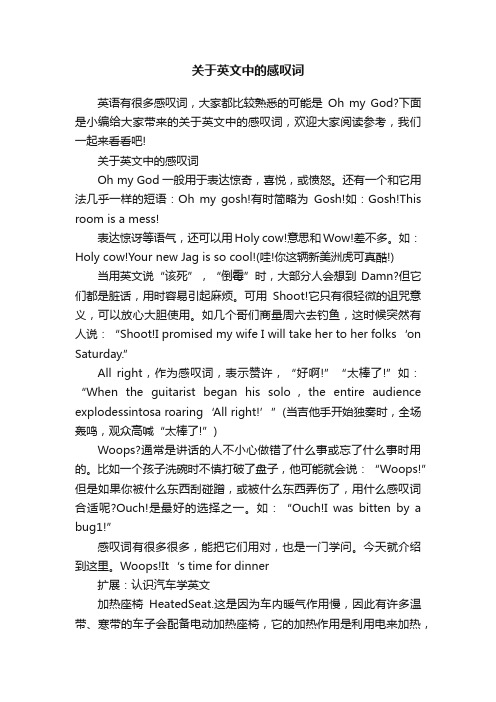
关于英文中的感叹词英语有很多感叹词,大家都比较熟悉的可能是Oh my God?下面是小编给大家带来的关于英文中的感叹词,欢迎大家阅读参考,我们一起来看看吧!关于英文中的感叹词Oh my God一般用于表达惊奇,喜悦,或愤怒。
还有一个和它用法几乎一样的短语:Oh my gosh!有时简略为Gosh!如:Gosh!This room is a mess!表达惊讶等语气,还可以用Holy cow!意思和Wow!差不多。
如:Holy cow!Your new Jag is so cool!(哇!你这辆新美洲虎可真酷!) 当用英文说“该死”,“倒霉”时,大部分人会想到Damn?但它们都是脏话,用时容易引起麻烦。
可用Shoot!它只有很轻微的诅咒意义,可以放心大胆使用。
如几个哥们商量周六去钓鱼,这时候突然有人说:“Shoot!I promised my wife I will take her to her folks‘on Saturday.”All right,作为感叹词,表示赞许,“好啊!”“太棒了!”如:“When the guitarist began his solo,the entire audience explodessintosa roaring‘All right!’”(当吉他手开始独奏时,全场轰鸣,观众高喊“太棒了!”)Woops?通常是讲话的人不小心做错了什么事或忘了什么事时用的。
比如一个孩子洗碗时不慎打破了盘子,他可能就会说:“Woops!”但是如果你被什么东西刮碰蹭,或被什么东西弄伤了,用什么感叹词合适呢?Ouch!是最好的选择之一。
如:“Ouch!I was bitten by a bug1!”感叹词有很多很多,能把它们用对,也是一门学问。
今天就介绍到这里。
Woops!It‘s time for dinner扩展:认识汽车学英文加热座椅HeatedSeat.这是因为车内暖气作用慢,因此有许多温带、寒带的车子会配备电动加热座椅,它的加热作用是利用电来加热,因此效果快。
感叹句的基本英语用法

感叹句的基本英语用法感叹句是用来表达惊讶、兴奋、赞叹等情感的句子。
以下是感叹句的一些基本用法:1. What + (a/an) + 形容词+ 名词+ 主语+ 谓语!例如:What a beautiful day!(多美的一天啊!)What an amazing performance!(多么精彩的表演啊!)2. How + 形容词/副词+ 主语+ 谓语!例如:How beautiful the flowers are!(花儿多美啊!)How quickly he finished the task!(他多么快地完成了任务啊!)3. How + 主语+ 谓语+ 宾语!例如:How clever she is!(她多聪明啊!)How well he sings!(他唱得多好听啊!)4. What + 不可数名词/复数名词+ 主语+ 谓语!例如:What delicious food!(多么好吃的食物啊!)What wonderful friends!(多么好的朋友啊!)5. How + 主语+ 谓语+ 宾语+ 地点状语!例如:How beautifully she dances in the ballroom!(她在舞厅里跳得多么美啊!)How hurriedly they ran to catch the train!(他们多么匆忙地跑去赶火车啊!)6. So + 形容词/副词+ that + 句子。
例如:She is so talented that she can play multiple instruments.(她非常有才华,能演奏多种乐器。
)It was so hot that we decided to go swimming.(天气太热了,我们决定去游泳。
)注意,在感叹句中通常会使用感叹号来结束句子,以突出情感的强烈程度。
地道英语感叹词的用法
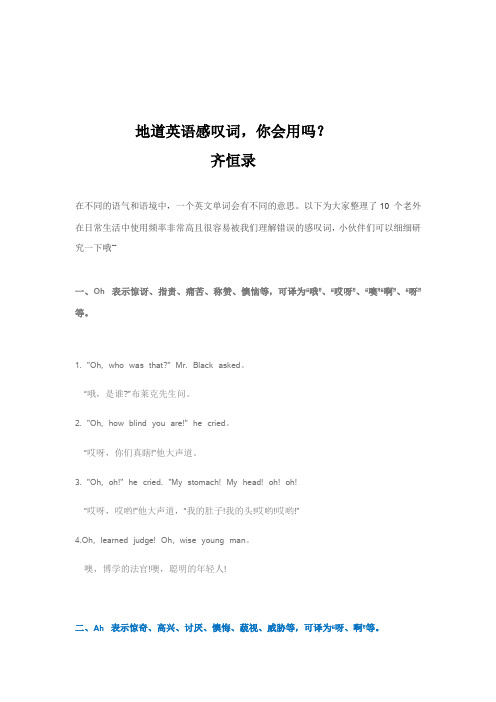
地道英语感叹词,你会用吗?齐恒录在不同的语气和语境中,一个英文单词会有不同的意思。
以下为大家整理了10个老外在日常生活中使用频率非常高且很容易被我们理解错误的感叹词,小伙伴们可以细细研究一下哦~一、Oh 表示惊讶、指责、痛苦、称赞、懊恼等,可译为“哦”、“哎呀”、“噢”“啊”、“呀”等。
1. "Oh, who was that?" Mr. Black asked。
“哦,是谁?”布莱克先生问。
2. "Oh, how blind you are!" he cried。
“哎呀,你们真瞎!”他大声道。
3. "Oh, oh!" he cried. "My stomach! My head! oh! oh!“哎呀,哎哟!”他大声道,“我的肚子!我的头!哎哟!哎哟!”4.Oh, learned judge! Oh, wise young man。
噢,博学的法官!噢,聪明的年轻人!二、Ah 表示惊奇、高兴、讨厌、懊悔、藐视、威胁等,可译为“呀、啊”等。
1. Ah, yes, Jeanne married a man with a lot of money。
啊,对啦,珍妮嫁给了一个很有钱的人。
2. "Ah, what splendid clothes!" thought the Emperor。
“啊!多华丽的衣服啊!”皇帝想。
3. Ah, how pitiful!呀,多可惜!4. Ah, here is the thing I am after。
哎呀,我找的东西在这儿呢。
三、come表示鼓励、不耐烦、引起注意、安慰等,可译为“喂、好吧、说吧、得啦”等。
1.Oh, come, Mathilde. Surely you can tell an old friend。
嗨,说吧,玛蒂尔德,你对老朋友说说总是可以的吧。
e, we must hurry。
2021年考研英语语法-感叹词用法小结
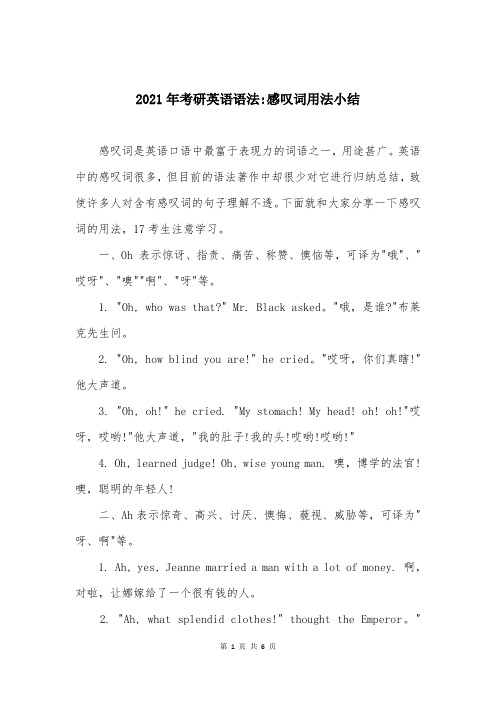
2021年考研英语语法:感叹词用法小结感叹词是英语口语中最富于表现力的词语之一,用途甚广。
英语中的感叹词很多,但目前的语法著作中却很少对它进行归纳总结,致使许多人对含有感叹词的句子理解不透。
下面就和大家分享一下感叹词的用法,17考生注意学习。
一、Oh 表示惊讶、指责、痛苦、称赞、懊恼等,可译为"哦"、"哎呀"、"噢""啊"、"呀"等。
1. "Oh, who was that?" Mr. Black asked。
"哦,是谁?"布莱克先生问。
2. "Oh, how blind you are!" he cried。
"哎呀,你们真瞎!"他大声道。
3. "Oh, oh!" he cried. "My stomach! My head! oh! oh!"哎呀,哎哟!"他大声道,"我的肚子!我的头!哎哟!哎哟!"4. Oh, learned judge! Oh, wise young man. 噢,博学的法官!噢,聪明的年轻人!二、Ah表示惊奇、高兴、讨厌、懊悔、藐视、威胁等,可译为"呀、啊"等。
1. Ah, yes, Jeanne married a man with a lot of money. 啊,对啦,让娜嫁给了一个很有钱的人。
2. "Ah, what splendid clothes!" thought the Emperor。
"啊!多华丽的衣服啊!"皇帝想。
3. Ah, how pitiful! 呀,多可惜!4. Ah, here is the thing I am after. 哎呀,我找的东西在这儿呢。
英语十大感叹词及其详细讲解

英语十大感叹词及其详细讲解感叹词是表达惊奇、兴奋、疑惑等感情的词语,它们能够在交流中增加情感色彩和表达力。
下面是英语中最常用的十大感叹词及其详细讲解。
1. Oh - 表示惊讶、兴奋或疑惑。
常用于对突发事件或意外情况的回应。
Oh - 表示惊讶、兴奋或疑惑。
常用于对突发事件或意外情况的回应。
2. Wow - 用于表达强烈的惊讶、赞叹或钦佩之情。
经常用于看到令人惊叹的事物或听到好消息时。
Wow - 用于表达强烈的惊讶、赞叹或钦佩之情。
经常用于看到令人惊叹的事物或听到好消息时。
3. Ouch - 表示疼痛、不适或受伤。
通常在碰到意外或突然疼痛时使用。
Ouch - 表示疼痛、不适或受伤。
通常在碰到意外或突然疼痛时使用。
4. Aha - 表示恍然大悟、理解或发现新信息。
通常在解决问题或有所领悟时使用。
Aha - 表示恍然大悟、理解或发现新信息。
通常在解决问题或有所领悟时使用。
5. Ah - 表示明白、猜疑或注意到某事。
常用于回应他人的话语或突然注意到的事物。
Ah - 表示明白、猜疑或注意到某事。
常用于回应他人的话语或突然注意到的事物。
6. Phew - 表示宽慰、松了一口气或解脱。
通常在压力、紧张情况解除后使用。
Phew - 表示宽慰、松了一口气或解脱。
通常在压力、紧张情况解除后使用。
7. Yikes - 表示惊恐、紧张或吃惊。
常用于对令人不快或恐怖的情况做出反应。
Yikes - 表示惊恐、紧张或吃惊。
常用于对令人不快或恐怖的情况做出反应。
8. Hmm - 表示思考、犹豫或考虑。
通常用于表达不确定或需要时间思考的情况。
Hmm - 表示思考、犹豫或考虑。
通常用于表达不确定或需要时间思考的情况。
9. Eww - 表示厌恶、恶心或毛骨悚然。
常用于对令人作呕或恶心的事物做出反应。
Eww - 表示厌恶、恶心或毛骨悚然。
常用于对令人作呕或恶心的事物做出反应。
10. Gosh - 用于表示惊讶、震惊或强烈的情感。
常用作类似于"哇"或"天啊"的说法。
英语口语感叹词 啊,天啊,哎呀的常用表示方法
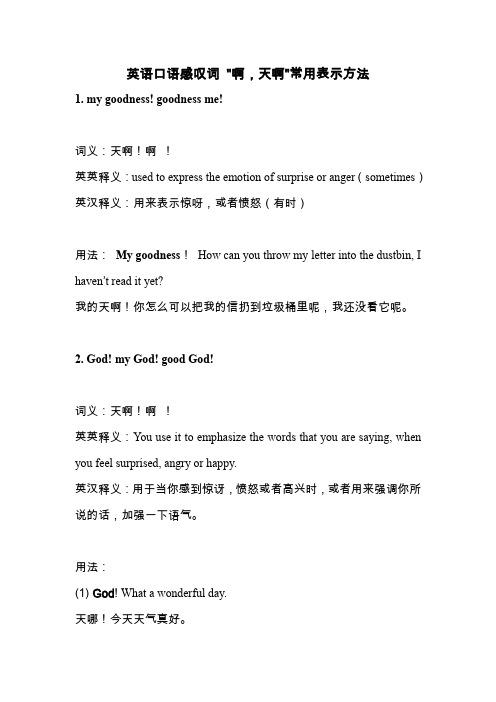
英语口语感叹词"啊,天啊"常用表示方法1. my goodness! goodness me!词义:天啊!啊!英英释义:used to express the emotion of surprise or anger(sometimes)英汉释义:用来表示惊呀,或者愤怒(有时)用法:My goodness!How can you throw my letter into the dustbin, I haven’t read it yet?我的天啊!你怎么可以把我的信扔到垃圾桶里呢,我还没看它呢。
2. God! my God! good God!词义:天啊!啊!英英释义:You use it to emphasize the words that you are saying, when you feel surprised, angry or happy.英汉释义:用于当你感到惊讶,愤怒或者高兴时,或者用来强调你所说的话,加强一下语气。
用法:(1) God! What a wonderful day.天哪!今天天气真好。
(2)My God! Do not talk again, I want to sleep early.天哪!不要再说话了,我想早点睡觉。
(3)Good God! The whole country is trapped in war, people there are living very bad lives.我的天啊,整个国家都陷入了战争,那里的人们在艰难的生活着。
3. ah词义:天哪!啊!英英释义:You can use it when you feel happy, surprised , disappointed, or you agree on someone’s opinion, or you want others to pay attention. 英汉释义:用于表示你感到高兴,惊奇, 失望,或者同意别人的意见或者让别人集中注意力时。
2019-英语口语中经常出现的感叹词的用法word版本 (1页)

2019-英语口语中经常出现的感叹词的用法word版本本文部分内容来自网络整理,本司不为其真实性负责,如有异议或侵权请及时联系,本司将立即删除!== 本文为word格式,下载后可方便编辑和修改! ==英语口语中经常出现的感叹词的用法感叹词是用来表示说话时表达的喜怒哀乐等情感的词。
它不构成后面句子的一个语法成分,却在意义上与它有关连,后面的句子一般说明这种情绪的性质、原因。
在英语口语中,感叹词尤其经常用到,下面整理下英语口语中经常出现的感叹词的用法:一、 there 表示得意、鼓励、同情、悲哀、不耐烦、失望、安慰、挑衅、引起注意等,可译为& ldquo ;哟、瞧、好啦、得啦等。
1. There ! There ! Never mind , you ' ll soon feel better .好啦,好啦,不要紧,你马上会好的。
2. Thefe , there , you said too much .得啦,得啦,你说的太多了。
3. There & mdash ; I ' ve filled it up again .瞧,我又把它灌满了。
4. There & mdash ; what ' s that ?哟,那是什么!二、 come 表示鼓励、不耐烦、引起注意、安慰等,可译为& ldquo ;喂、好吧、说吧、得啦等。
1. Oh , come , Mathilde . Surely you can tell an old friend .嗨,说吧,玛蒂尔德,你对老朋友说说总是可以的吧。
2. Come , we must hurry .喂,我们得赶紧啦!3. Come , come , get him his change . Tod , get him hischange .好吧,好吧,托德,快把钱找给他,快把钱找给他。
4. Come , come ! What were you really doing behind the bicycle sheds ?喂!喂!你还在车棚里磨蹭啥?。
感叹词基础知识

感叹词基础知识感叹词是表达强烈感情或感叹某种情况的词语。
它们常常用来表达喜悦、惊讶、敬畏、愤怒等情感,带有强烈的感情色彩。
在语法上,感叹词通常单独使用,不和其他词语连用。
感叹词的形式多种多样,包括单个词、短语、句子等。
下面是一些常见的感叹词及其用法。
1. 单个词的感叹词:这些感叹词通常单独使用,可以作为独立句子或与其他句子连用。
- 哦(Oh):用来表示惊讶、赞叹等情感。
- 嗯(Ah):表达各种情感,如惊讶、愉快、认同等。
- 哇(Wow):表示惊讶、兴奋等。
- 咦(Huh):表示惊讶、疑惑等。
- 啊(Ah):表达各种感情,具体含义根据语境而定。
2. 短语的感叹词:这些感叹词由两个或多个词组成,常常用于表达特定的情感。
- 太棒了(Fantastic):表示事物非常好,令人赞叹。
- 真是的(Oh no):表示遗憾、不满或惊讶等情感。
- 天哪(Oh my goodness):表示惊讶、震惊等强烈的情感。
- 真的吗(Really):表示怀疑、惊讶等。
3. 句子的感叹词:这些感叹词是完整的句子,用于表达复杂的情感或感叹。
- 你怎么会这样呢(How could you):表示愤怒、失望等情感。
- 太不可思议了(It's unbelievable):表示非常惊讶或不可思议。
- 太神奇了(It's amazing):表示事物非常奇妙或令人惊讶。
感叹词在口语和书面语中都被广泛使用,能够增添语言的表现力和感情色彩。
在使用感叹词时,需要注意以下几点:1. 语气的把握:感叹词通常以感叹的口气发出,要注意语气的把握,使其听起来自然流畅。
2. 上下文的适应:感叹词的具体含义和强调程度可以根据上下文的不同而变化,要根据具体情况选择合适的感叹词。
3. 注意场合:感叹词在口语和非正式场合中更常见,但在正式场合或正式写作中应适度使用,避免过于随意。
感叹词是日常交流中常用的一种语言表达方式,它们能够体现说话者的真实情感,增强交流的亲切性和表现力。
英语感叹句的用法英语感叹句如何使用
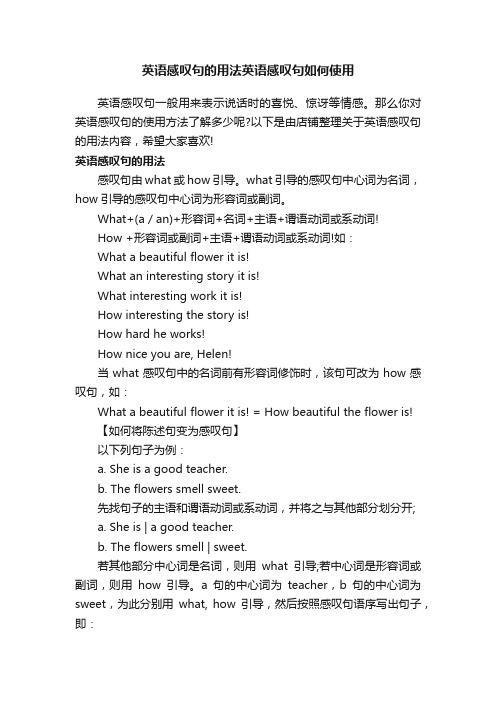
英语感叹句的用法英语感叹句如何使用英语感叹句一般用来表示说话时的喜悦、惊讶等情感。
那么你对英语感叹句的使用方法了解多少呢?以下是由店铺整理关于英语感叹句的用法内容,希望大家喜欢!英语感叹句的用法感叹句由what 或how引导。
what引导的感叹句中心词为名词,how引导的感叹句中心词为形容词或副词。
What+(a / an)+形容词+名词+主语+谓语动词或系动词!How +形容词或副词+主语+谓语动词或系动词!如:What a beautiful flower it is!What an interesting story it is!What interesting work it is!How interesting the story is!How hard he works!How nice you are, Helen!当what感叹句中的名词前有形容词修饰时,该句可改为how感叹句,如:What a beautiful flower it is! = How beautiful the flower is!【如何将陈述句变为感叹句】以下列句子为例:a. She is a good teacher.b. The flowers smell sweet.先找句子的主语和谓语动词或系动词,并将之与其他部分划分开;a. She is | a good teacher.b. The flowers smell | sweet.若其他部分中心词是名词,则用what引导;若中心词是形容词或副词,则用how引导。
a句的中心词为teacher,b句的中心词为sweet,为此分别用what, how引导,然后按照感叹句语序写出句子,即:a. What a good teacher she is!b. How sweet the flowers smell!又如:a. He did so fast.b. She read a good book yesterday.→ a. He did│so fast.b. She read│a good book yesterday.→ a. How fast he di d!b. What a good book she read yesterday!英语感叹句的例题练习例题1____ clever the boy is!A. HowB. What例题2____ good teachers they are!A. HowB. What考点一选what还是how?切分句子。
英语中常用的感叹词
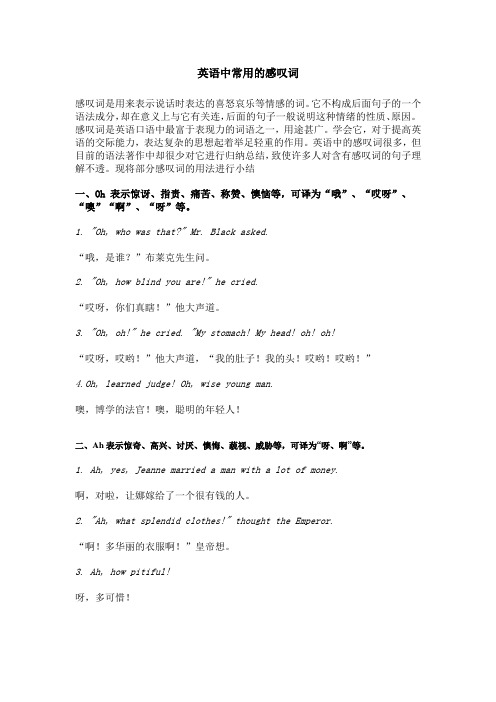
英语中常用的感叹词感叹词是用来表示说话时表达的喜怒哀乐等情感的词。
它不构成后面句子的一个语法成分,却在意义上与它有关连,后面的句子一般说明这种情绪的性质、原因。
感叹词是英语口语中最富于表现力的词语之一,用途甚广。
学会它,对于提高英语的交际能力,表达复杂的思想起着举足轻重的作用。
英语中的感叹词很多,但目前的语法著作中却很少对它进行归纳总结,致使许多人对含有感叹词的句子理解不透。
现将部分感叹词的用法进行小结一、Oh 表示惊讶、指责、痛苦、称赞、懊恼等,可译为“哦”、“哎呀”、“噢”“啊”、“呀”等。
1. "Oh, who was that?" Mr. Black asked.“哦,是谁?”布莱克先生问。
2. "Oh, how blind you are!" he cried.“哎呀,你们真瞎!”他大声道。
3. "Oh, oh!" he cried. "My stomach! My head! oh! oh!“哎呀,哎哟!”他大声道,“我的肚子!我的头!哎哟!哎哟!”4.Oh, learned judge! Oh, wise young man.噢,博学的法官!噢,聪明的年轻人!二、Ah表示惊奇、高兴、讨厌、懊悔、藐视、威胁等,可译为“呀、啊”等。
1. Ah, yes, Jeanne married a man with a lot of money.啊,对啦,让娜嫁给了一个很有钱的人。
2. "Ah, what splendid clothes!" thought the Emperor.“啊!多华丽的衣服啊!”皇帝想。
3. Ah, how pitiful!呀,多可惜!4. Ah, here is the thing I am after.哎呀,我找的东西在这儿呢。
三、come表示鼓励、不耐烦、引起注意、安慰等,可译为“喂、好吧、说吧、得啦”等。
英语感叹句方法和技巧口诀
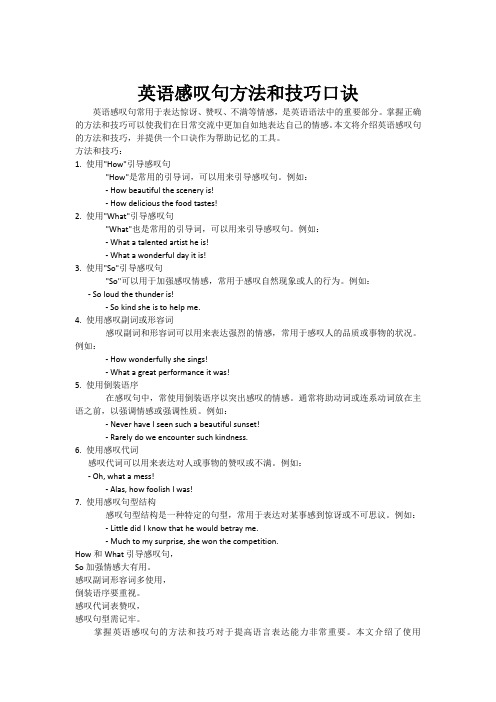
英语感叹句方法和技巧口诀英语感叹句常用于表达惊讶、赞叹、不满等情感,是英语语法中的重要部分。
掌握正确的方法和技巧可以使我们在日常交流中更加自如地表达自己的情感。
本文将介绍英语感叹句的方法和技巧,并提供一个口诀作为帮助记忆的工具。
方法和技巧:1. 使用"How"引导感叹句"How"是常用的引导词,可以用来引导感叹句。
例如:- How beautiful the scenery is!- How delicious the food tastes!2. 使用"What"引导感叹句"What"也是常用的引导词,可以用来引导感叹句。
例如:- What a talented artist he is!- What a wonderful day it is!3. 使用"So"引导感叹句"So"可以用于加强感叹情感,常用于感叹自然现象或人的行为。
例如:- So loud the thunder is!- So kind she is to help me.4. 使用感叹副词或形容词感叹副词和形容词可以用来表达强烈的情感,常用于感叹人的品质或事物的状况。
例如:- How wonderfully she sings!- What a great performance it was!5. 使用倒装语序在感叹句中,常使用倒装语序以突出感叹的情感。
通常将助动词或连系动词放在主语之前,以强调情感或强调性质。
例如:- Never have I seen such a beautiful sunset!- Rarely do we encounter such kindness.6. 使用感叹代词感叹代词可以用来表达对人或事物的赞叹或不满。
例如:- Oh, what a mess!- Alas, how foolish I was!7. 使用感叹句型结构感叹句型结构是一种特定的句型,常用于表达对某事感到惊讶或不可思议。
英语口语感叹词有哪些实用1篇

英语口语感叹词有哪些实用1篇英语口语感叹词有哪些 1· damndamn本身十分多变,使用起来很灵活。
1)可以用作形容词,解释为“讨厌的,可恶的”用来形容感情上的状态,还有“完全的,十分的”表示程度的意思。
I hate doing the damn laundry.我讨厌洗这该死的衣服。
2)作为名词,表示“一点,丝毫;诅咒”;While it isn’t worth a damn.然而什么用都没有。
(然并卵)常用的搭配有:not to give a damn. 漠不关心;满不在乎I don’t give a damn.我根本不在乎。
3)作为副词,则是“非常”的含义;As it turned out, I was damn right.事实证明,我的做法完全正确。
4)作为动词,表示“罚。
下地狱;指责;咒骂”You shouldn’t damn your friend.你不应该咒骂你的朋友。
Well, I’ll be damned!好吧,我完蛋了!5)在口语中,作为感叹词使用,常用“该死”来解释。
常用搭配:damn it。
Damn it! I forgot to turn off the gas.该死!我忘了关煤气。
· gee whiz其实gee whiz就是gee的升级版啦!都是表示惊讶,感叹,不确定等情绪的一个感叹词。
“哎哟!嗬!不得了!”Gee whiz, Trump put all those millionaires in charge of the departments!天哪,__把(政府)部门都交给了那些百万富翁主管!· oops“哎哟”,表示惊讶,或者造成了什么不好结果时发出的感叹。
这一般都是用在看到了很糟糕的情况,类似于“啊噢”的感觉。
可以单独使用。
Oops, we made a mistake.啊噢,我们犯了个错。
Oops, you caught me!哎呀,给你抓住了!。
英语语法知识——感叹词
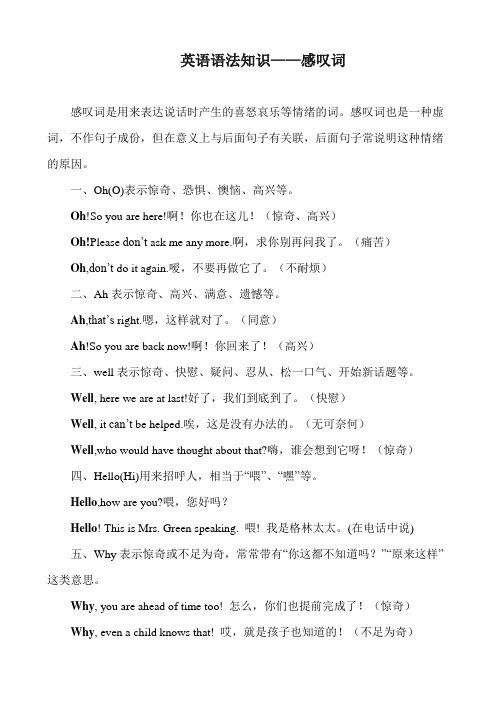
英语语法知识——感叹词感叹词是用来表达说话时产生的喜怒哀乐等情绪的词。
感叹词也是一种虚词,不作句子成份,但在意义上与后面句子有关联,后面句子常说明这种情绪的原因。
一、Oh(O)表示惊奇、恐惧、懊恼、高兴等。
Oh!So you are here!啊!你也在这儿!(惊奇、高兴)Oh!Please don’t ask me any more.啊,求你别再问我了。
(痛苦)Oh,don’t do it again.嗳,不要再做它了。
(不耐烦)二、Ah表示惊奇、高兴、满意、遗憾等。
Ah,that’s right.嗯,这样就对了。
(同意)Ah!So you are back now!啊!你回来了!(高兴)三、well表示惊奇、快慰、疑问、忍从、松一口气、开始新话题等。
Well, here we are at last!好了,我们到底到了。
(快慰)Well, it can’t be helped.唉,这是没有办法的。
(无可奈何)Well,who would have thought about that?嗨,谁会想到它呀!(惊奇)四、Hello(Hi)用来招呼人,相当于“喂”、“嘿”等。
Hello,how are you?喂,您好吗?Hello! This is Mrs. Green speaking. 喂! 我是格林太太。
(在电话中说)五、Why表示惊奇或不足为奇,常常带有“你这都不知道吗?”“原来这样”这类意思。
Why, you are ahead of time too! 怎么,你们也提前完成了!(惊奇)Why, even a child knows that! 哎,就是孩子也知道的!(不足为奇)六、Oh dear ,dear, dear me, (my)goodness表示惊异赞叹、不耐烦、难过等,与汉语里的“天呀”有些相近(这类感叹词女人用得比较多)。
My goodness!How could you work so fast! 我的天!你怎么干得这么快!Oh ,dear!Why should you be so stubborn! 天哪,你怎么这么固执!七、O lord, Good lord , Good heavens表示惊异、不高兴等(这种感叹词男人用得比较多)。
英语感叹词的用法

英语感叹词的用法
1. Oh:表示惊讶、轻蔑、遗憾等情绪。
例如:Oh, no!(哦,不!)
2. Wow:表示惊喜、赞叹等情绪。
例如:Wow, this is amazing!(哇,太棒了!)
3. Ah:表示理解、恍然大悟等情绪。
例如:Ah, now I get it!(啊,现在我懂了!)
4. Ouch:表示疼痛、受伤等情绪。
例如:Ouch, that hurt!(哎呀,好疼!)
5. Alas:表示失望、悲伤等情绪。
例如:Alas, it was all for nothing.(唉,白费力气了。
)
6. Hooray:表示庆祝、喜悦等情绪。
例如:Hooray, we won!(万岁,我们赢了!)
7. Yikes:表示惊恐、害怕等情绪。
例如:Yikes, that scared me!(哎呀,吓我一跳!)
8. Phew:表示松了一口气、解脱等情绪。
例如:Phew, that was close!(呼,太危险了!)
以上是一些常见的英语感叹词,根据情境和个人习惯,感叹词的使用
可能有所变化。
英语感叹句的用法及构成

英语感叹句的用法及构成第一篇:英语感叹句的用法及构成感叹句一、感叹句用法:表示说话人的强烈的感情。
二、结构:What+(a / an)+形容词+名词+(主语+谓语)!例如:1)What a cold day(it is)!今天天气真冷啊!2)What an old house(it is)!这间房子真老啊!3)What a clever boy he is!(他是个)多么聪明的男孩啊!4)What an interesting story it is!(这是个)多么有趣的故事啊!5)What beautiful flowers they are!(它们是)多么漂亮的花啊!6)What happy children(they are)!孩子们多快乐啊!7)What nice air(it is)!空气真好啊!8)What delicious food(it is)!多好吃的食物啊!9)What fine weather it is!多好的天气啊!但有些不可数名词,如 rain, surprise, breakfast, lunch 等,当前面有形容词修饰,使抽象名词具体化时,则要用what a / an,如:What a heavy rain it is!多大的一场雨啊!What a great surprise it is!这多么令人惊奇啊!What a rich breakfast it is!多么丰盛的一顿早餐啊!2.How+形容词/副词+(主语+谓语)!例如:6)How cold (it is)today!今天天气真冷啊!7)How happy(the children are)!孩子们真愉快啊!8)How hard(the student works)!这个学生学习多努力啊!9)How well(Mr Zhao teaches)!赵先生教得多好啊!10)How happily(the boys are playing)!那些男孩们玩得多开心啊!11)How well you look!你气色真好!12)How kind you are!你心肠真好!13)How beautifully you sing!你唱得真好听!14)Strawberries!How nice!草莓!多好呀!15)How clever the boy is!这个男孩多么聪明啊!16)How fast he runs!他跑得多么快啊!17)How I want to be a doctor!我多么想成为一名医生啊!①It’s an interesting film.这是一部有趣的电影。
感叹词英语词汇大全增添情感色彩的表达方式

感叹词英语词汇大全增添情感色彩的表达方式感叹词是我们日常生活和表达中经常使用的一种词类,它们可以增添情感色彩,表达惊讶、喜悦、惋惜等各种感受。
下面是一份感叹词的英语词汇大全,帮助你丰富表达方式,更加生动地表达自己的情感。
1. 喜悦和惊讶的感叹词:- Wow!(哇!)- Amazing!(太棒了!)- Incredible!(不可思议!)- Fantastic!(太神奇了!)- Unbelievable!(难以置信!)- Marvelous!(太奇妙了!)- Astonishing!(太惊人了!)- Wonderful!(太美妙了!)- Impressive!(令人印象深刻!)- Terrific!(太了不起了!)- Remarkable!(非同寻常!)- Outstanding!(卓越的!)2. 惋惜和失望的感叹词:- Oh no!(哦,不!)- What a shame!(真可惜!)- How disappointing!(多么令人失望!) - It's a pity!(太可惜了!)- So close!(离成功如此之近!)- That's too bad!(太糟糕了!)3. 愤怒和不满的感叹词:- Oh my God!(天哪!)- How dare you!(你竟敢!)- What on earth!(到底是怎么回事!) - This is outrageous!(太过分了!)- I can't believe this!(我无法相信!)4. 疑问和困惑的感叹词:- Huh?(咦?)- What?(什么?)- Why?(为什么?)- Really?(真的吗?)- Seriously?(认真的吗?)- Are you kidding me?(你在开玩笑吗?)5. 欢呼和打气的感叹词:- Hooray!(万岁!)- Bravo!(好极了!)- Well done!(做得好!)- You can do it!(你能行的!)- Keep it up!(继续加油!)- You rock!(你太棒了!)6. 思考和认同的感叹词:- Hmm(嗯)- Yeah/Yes(是的)- I see(我明白)- Exactly(完全正确)- Right(对)- That's true(那是真的)7. 欢迎和感激的感叹词:- Welcome!(欢迎!)- Thank you so much!(非常感谢!)- I really appreciate it!(我非常感激!)- That means a lot to me!(那对我来说很重要!)- You're the best!(你是最棒的!)- I owe you one!(我欠你一个人情!)8. 遗憾和不满的感叹词:- Alas!(唉!)- Oh dear!(天哪!)- What a pity!(多么可惜!)- I'm so mad!(我真生气!)- It's not fair!(这太不公平了!)这些感叹词可以根据具体的情境和表达需要进行灵活运用。
英语感叹词意思及其应用
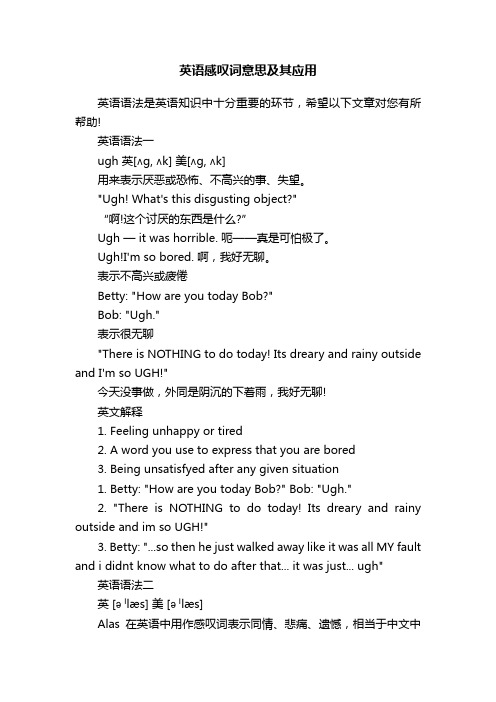
英语感叹词意思及其应用英语语法是英语知识中十分重要的环节,希望以下文章对您有所帮助!英语语法一ugh 英[ʌg, ʌk] 美[ʌɡ, ʌk]用来表示厌恶或恐怖、不高兴的事、失望。
"Ugh! What's this disgusting object?"“啊!这个讨厌的东西是什么?”Ugh — it was horrible. 呃——真是可怕极了。
Ugh!I'm so bored. 啊,我好无聊。
表示不高兴或疲倦Betty: "How are you today Bob?"Bob: "Ugh."表示很无聊"There is NOTHING to do today! Its dreary and rainy outside and I'm so UGH!"今天没事做,外同是阴沉的下着雨,我好无聊!英文解释1. Feeling unhappy or tired2. A word you use to express that you are bored3. Being unsatisfyed after any given situation1. Betty: "How are you today Bob?" Bob: "Ugh."2. "There is NOTHING to do today! Its dreary and rainy outside and im so UGH!"3. Betty: "...so then he just walked away like it was all MY fault and i didnt know what to do after that... it was just... ugh"英语语法二英 [əˈlæs] 美 [əˈlæs]Alas在英语中用作感叹词表示同情、悲痛、遗憾,相当于中文中的叹气“唉”。
英语口语感叹词有哪些

英语口语感叹词有哪些英语口语感叹词有哪些我们学习英语口语时,最纠结的就是老外的感叹了。
其实,想要搞懂老外的感叹话语,学习下面这些英语口语感叹词,会有所帮助哦。
· damndamn本身十分多变,使用起来很灵活。
1)可以用作形容词,解释为“讨厌的,可恶的”用来形容感情上的状态,还有“完全的,十分的”表示程度的意思。
I hate doing the damn laundry.我讨厌洗这该死的衣服。
2)作为名词,表示“一点,丝毫;诅咒”;While it isn’t worth a damn.然而什么用都没有。
(然并卵)常用的搭配有:not to give a damn. 漠不关心;满不在乎I don’t give a damn.我根本不在乎。
3)作为副词,则是“非常”的含义;As it turned out, I was damn right.事实证明,我的做法完全正确。
4)作为动词,表示“罚…下地狱;指责;咒骂”You shouldn’t damn your friend.你不应该咒骂你的朋友。
Well, I’ll be damned!好吧,我完蛋了!5)在口语中,作为感叹词使用,常用“该死”来解释。
常用搭配:damn it。
Damn it! I forgot to turn off the gas.该死!我忘了关煤气。
· gee whiz其实gee whiz就是gee的升级版啦!都是表示惊讶,感叹,不确定等情绪的一个感叹词。
“哎哟!嗬!不得了!”Gee whiz, Trump put all those millionaires in charge of the departments!天哪,特朗普把(政府)部门都交给了那些百万富翁主管!· oops“哎哟”,表示惊讶,或者造成了什么不好结果时发出的感叹。
这一般都是用在看到了很糟糕的情况,类似于“啊噢”的感觉。
可以单独使用。
英语口语感叹词有些

英语口语感慨词有些我们学习时,最纠结的就是老外的感慨了。
其实,想要搞懂老外的感慨话语,学习下面这些英语口语感慨词,会有所帮助哦。
· damndamn本身十分多变,使用起来很灵活。
1)可以用作形容词,解释为“讨厌的,可恶的”用来形容感情上的状态,还有“完全的,十分的”表示程度的意思。
I hate doing the damn laundry.我讨厌洗这该死的衣服。
2)作为名词,表示“一点,丝毫;诅咒”;While it isn’t worth a damn.然而什么用都没有。
(然并卵)常用的搭配有:not to give a damn. 漠不关心;满不在乎I don’t give a damn.我根本不在乎。
3)作为副词,那么是“非常”的含义;As it turned out, I was damn right.事实证明,我的做法完全正确。
4)作为动词,表示“罚…下地狱;指责;咒骂”You shouldn’t damn your friend.你不应该咒骂你的朋友。
Well, I’ll be damned!好吧,我完蛋了!5)在口语中,作为感慨词使用,常用“该死”来解释。
常用搭配:damn it。
Damn it! I forgot to turn off the gas.该死!我忘了关煤气。
· gee whiz其实gee whiz就是gee的升级版啦!都是表示惊讶,感慨,不确定等情绪的一个感慨词。
“哎哟!嗬!不得了!”Gee whiz, Trump put all those millionaires in charge of the departments!天哪,特朗普把(政府)部门都交给了那些百万富翁主管!· oops“哎哟”,表示惊讶,或者造成了什么不好结果时发出的感慨。
这一般都是用在看到了很糟糕的情况,类似于“啊噢”的感觉。
可以单独使用。
Oops, we made a mistake.啊噢,我们犯了个错。
- 1、下载文档前请自行甄别文档内容的完整性,平台不提供额外的编辑、内容补充、找答案等附加服务。
- 2、"仅部分预览"的文档,不可在线预览部分如存在完整性等问题,可反馈申请退款(可完整预览的文档不适用该条件!)。
- 3、如文档侵犯您的权益,请联系客服反馈,我们会尽快为您处理(人工客服工作时间:9:00-18:30)。
地道英语感叹词,你会用吗?
齐恒录
在不同的语气和语境中,一个英文单词会有不同的意思。
以下为大家整理了10个老外在日常生活中使用频率非常高且很容易被我们理解错误的感叹词,小伙伴们可以细细研究一下哦~
一、Oh 表示惊讶、指责、痛苦、称赞、懊恼等,可译为“哦”、“哎呀”、“噢”“啊”、“呀”等。
1. "Oh, who was that?" Mr. Black asked。
“哦,是谁?”布莱克先生问。
2. "Oh, how blind you are!" he cried。
“哎呀,你们真瞎!”他大声道。
3. "Oh, oh!" he cried. "My stomach! My head! oh! oh!
“哎呀,哎哟!”他大声道,“我的肚子!我的头!哎哟!哎哟!”
4.Oh, learned judge! Oh, wise young man。
噢,博学的法官!噢,聪明的年轻人!
二、Ah 表示惊奇、高兴、讨厌、懊悔、藐视、威胁等,可译为“呀、啊”等。
1. Ah, yes, Jeanne married a man with a lot of money。
啊,对啦,珍妮嫁给了一个很有钱的人。
2. "Ah, what splendid clothes!" thought the Emperor。
“啊!多华丽的衣服啊!”皇帝想。
3. Ah, how pitiful!
呀,多可惜!
4. Ah, here is the thing I am after。
哎呀,我找的东西在这儿呢。
三、come表示鼓励、不耐烦、引起注意、安慰等,可译为“喂、好吧、说吧、得啦”等。
1.Oh, come, Mathilde. Surely you can tell an old friend。
嗨,说吧,玛蒂尔德,你对老朋友说说总是可以的吧。
e, we must hurry。
喂,我们得赶紧啦!
e, come, get him his change. Tod, get him his change。
好吧,好吧,托德,快把钱找给他,快把钱找给他。
4. Come, come! What were you really doing behind the bicycle sheds?
喂!喂!你还在车棚里磨蹭啥?
四、dear表示后悔、难过、怜悯、同情、吃惊、盼望等,可译为“哎呀、天哪”等。
1. Dear! What awful weather!
哎呀!多糟的天气!
2. Oh, dear, dear! Where can Harry be?
天哪,天哪,亨利会在哪儿?
3. Dear, dear! Where have I put my keys?
哎呀,我把钥匙放在哪儿啦?
4. "Dear me," he said to himself, "Am I foolish or unfit for my office?"
"哎呀!"他心里嘀咕着,“我是愚蠢呢还是不称职?”
五、well表示快慰、让步、期望、讥讽、解释、责备、犹豫等,可译为“好吧、不过、好啦、嗯”等。
1. Well, your father has found him in the garage。
好啦,你父亲在车库里找到他了。
2. Are you sure? Well, perhaps you, are right。
你能肯定吗?嗯,也许你说得对。
3. Well, you must come to lunch tomorrow。
不过,你明天一定要来吃午饭。
4. I handed the note to him and said, "Oh, very well, I apologize."
我把那张票子递给了他,说道:“啊,好极了,我向你道歉。
”
5. Well, why don't you make a notice like theirs?
那么,你为什么不做个像他们那样的广告牌呢?
六、now 表示警告、命令、请求、说明、安慰筹,可译为“喂、喏、好了”等,有时也可不必译出。
1. Now, now, you two; Don't fight again。
喂,喂,你们俩,别再打了。
2. Now, now, my boy! It's all right! There's no need to cry!
好了,好了,孩子,没事了,别哭了。
3. Now, let's play basketball。
喏,咱们打篮球吧!
4. Now, lift me up, Doctor, lift me up. Where is he?
把我扶起来吧,医生,把我扶起来。
他在哪里?
七、there表示得意、鼓励、同情、悲哀、不耐烦、失望、安慰、挑衅、引起注意等,可译为“哟、瞧、好啦、得啦”等。
1.There! There! Never mind, you'll soon feel better。
好啦,好啦,不要紧,你马上会好的。
2. There, there, you said too much。
得啦,得啦,你说的太多了。
3.There, I've filled it up again。
瞧,我又把它灌满了。
4.There, what's that?
哟,那是什么!
八、man表示兴奋、轻蔑、不耐烦、引起注意、可译为“啊、嗨”等。
1."Use you knife, man!" ordered the British officer nearby。
“嗨,用刀子割!”旁边的英国军官命令道。
2. Hurry up, man。
嗨,快点。
3. We have won the match, man!
啊,我们胜利了。
九、boy表示高兴、兴奋、惊奇等,可译为“嘿、哇、哼、怎么样”等。
1. Boy, oh, boy! Our team's going to win! How fantastic?
哇,怎么样!我们队要赢了!真是太好了!
2.Boy! This soup is good, Mama!
嘿,妈妈,这汤好得很。
3.Oh, boy! I just had a wonderful dream!
嘿,我刚才做了个好梦。
十、此外还有:
1. ha(惊奇、疑惑、鄙视)
Ha! Pround as these nobles are, he is afraid to see me。
哈!这些贵族尽管傲慢,他却害怕见到我。
aha(得意、惊奇、嘲弄、满意)
The trousers are all right; now the waistcoat; aha, right again。
裤子合身;再请穿上背心试试;啊哈,也很合适。
hey(喜悦、打招呼)
Hey! I didn't expect to meet you here。
嗨,我没想到会在这儿遇到你。
sh(制止、引起注意)
They were about to go down. When Tum suddenly whispered. "Sh! Keep still. Don't move!"他们正想再下去,这时托姆突然低声道:“嘘,安静,别动!”
why(吃惊、抗议)
Why, what's the harm?
咳,这有什么害处呢?
nonsense(胡说)
"Nonsense," the king shouted. "My cook is the best cook in the world."“胡说!”那国王喊道,“我的厨师是世界上最好的厨师。
”
Good heavens(惊异、不高兴)
Good heavens! Listen to that silly child," said the father。
“天哪!听听那傻孩子在瞎说些什么!”孩子的父亲说。
